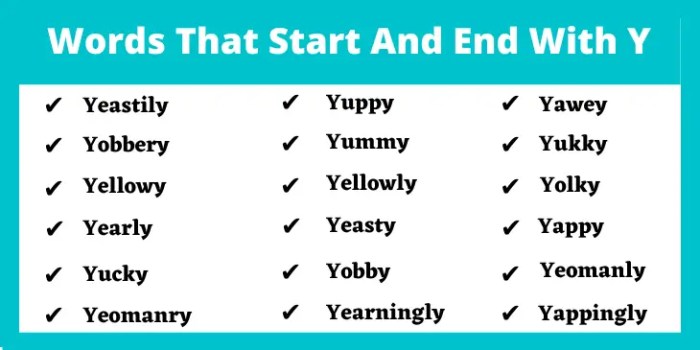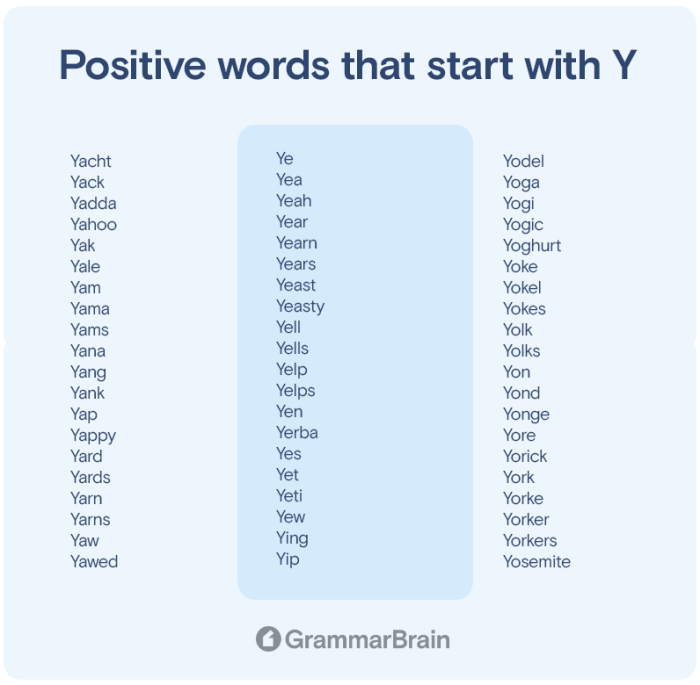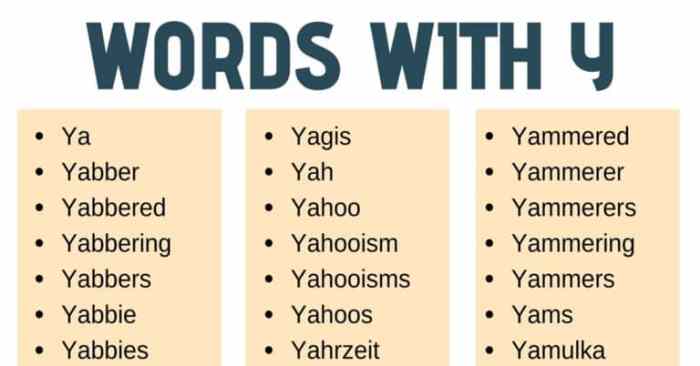In the vast tapestry of the English language, words ending with “y” weave a captivating thread, adding a distinct charm and intriguing linguistic patterns. Embark on a journey to unravel the intricacies of these words, from their historical roots to their grammatical nuances, as we delve into the realm of “palabras que terminen con y en ingles.”
Words ending with “y” possess a unique character, often evoking a sense of familiarity and warmth. They can transform nouns into adjectives, verbs into nouns, and adjectives into adverbs, showcasing the versatility of this enigmatic letter. Join us as we uncover the secrets behind these captivating words, exploring their formation, pronunciation, and cultural significance.
Definition and Usage

Words ending with “y” in English are typically nouns, adjectives, or adverbs. They are formed by adding the suffix “-y” to a base word, which can be a noun, verb, or adjective.
When “-y” is added to a noun, it often indicates a quality or characteristic associated with the noun. For example, the word “beauty” is a noun that describes a quality, while the word “beaut y” is an adjective that describes something as having that quality.
When “-y” is added to a verb, it often forms an adverb that describes how something is done. For example, the verb “run” can be modified by the adverb “quick ly” to describe how fast someone is running.
There are a few exceptions to these rules. For example, the word “happy” is an adjective that does not end with “-y”, and the word “daily” is an adverb that does not end with “-y”.
Common Suffixes: Palabras Que Terminen Con Y En Ingles
The most common suffix that is added to words to form “y” endings is “-ly”. This suffix is used to form adverbs from adjectives. For example, the adjective “quick” can be modified by the suffix “-ly” to form the adverb “quick ly“.
Other common suffixes that can be added to words to form “y” endings include “-ty”, “-ity”, and “-acy”. These suffixes are used to form nouns that describe qualities or characteristics. For example, the suffix “-ty” can be added to the adjective “beautif ul” to form the noun “beau ty“.
Pronunciation Patterns

The letter “y” can represent different sounds in different words ending with “y”. The most common sound is the “ee” sound, as in the word “happy”. However, the letter “y” can also represent the “i” sound, as in the word “city”, or the “uh” sound, as in the word “funny”.
The pronunciation of the letter “y” in words ending with “y” is determined by the consonant that precedes it. If the consonant is voiced, such as “b”, “d”, or “g”, then the letter “y” will typically represent the “ee” sound.
If the consonant is voiceless, such as “p”, “t”, or “k”, then the letter “y” will typically represent the “i” sound.
Word Formation and Morphology

Words ending with “y” can be formed through a variety of morphological processes. One common process is the addition of the suffix “-y” to a base word. For example, the noun “beaut y” is formed by adding the suffix “-y” to the adjective “beautif ul“.
Another common process is the conversion of a verb into an adjective by adding the suffix “-y”. For example, the verb “run” can be converted into the adjective “runn y” by adding the suffix “-y”.
Words ending with “y” can also be formed through the process of compounding. For example, the word “everyday” is formed by compounding the words “every” and “day”.
Etymology and Historical Development
The use of words ending with “y” in English has a long history. The suffix “-y” was first used in Old English to form adjectives from nouns. Over time, the suffix “-y” began to be used to form adverbs from adjectives and nouns from verbs.
The use of words ending with “y” has continued to evolve over time. In Modern English, words ending with “y” are used in a wide variety of contexts and can have a variety of meanings.
Cultural and Literary Significance

Words ending with “y” have played an important role in English culture and literature. These words have been used to create a wide range of effects, from the humorous to the sublime.
For example, the word “happy” is often used to describe a state of contentment or joy. The word “pretty” is often used to describe something that is pleasing to the eye. And the word “funny” is often used to describe something that is amusing.
Words ending with “y” have also been used to create a sense of rhythm and flow in poetry and prose. For example, the poet William Blake used the word “happy” in his poem “The Tyger” to create a sense of wonder and awe.
Essential Questionnaire
What are the common suffixes that form words ending with “y”?
Common suffixes include “-ly” (adverbs), “-ty” (nouns), “-ify” (verbs), “-fy” (verbs), and “-y” (adjectives).
How is the letter “y” pronounced in words ending with “y”?
The pronunciation of “y” varies depending on the word. It can represent the “ee” sound (e.g., “happy”), the “i” sound (e.g., “city”), or the “ai” sound (e.g., “mystery”).
What is the morphological process involved in forming words ending with “y”?
Words ending with “y” are often formed by adding a suffix to a base word. For example, “happy” is formed by adding the suffix “-y” to the base word “hap.” This process can change the part of speech and meaning of the word.